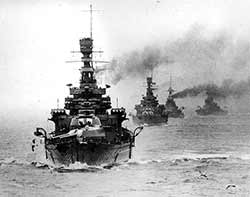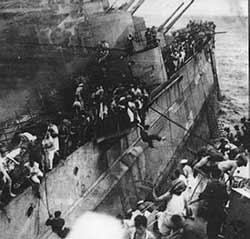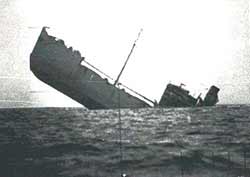|
Northern Convoys

Mr David Wright
In the year 2005, we expect instant news – reports of events in real time. This is especially true for reports of wars and terrorist or other disasters. There often seem to be more TV crews at the scene than there are soldiers or police, all falling over each other to be the first to bring the news to our radios and screens.
It was very different in the 1940s when the Second World War1 raged. Then there was no TV to bring events right into our homes. There were some accredited ‘war correspondents’ and photographers with military units2, but they were severely censored - restricted in what news they could report. As for naval battles, there was seldom any news at all until long after they had happened, if at all. Much of the time we had little idea of exactly what was happening.
 Great Britain is an island, as you know, so the sea and maritime affairs have always been dear to our hearts and vital to our interests. Early in the war, our army had been driven out of Europe by the Germans, leaving behind most of its guns and equipment. The RAF3 was fighting a desperate battle in the air against a determined Luftwaffe4 and the Royal Navy had suffered heavy losses – HMS5 Hood, HMS Repulse, HMS Prince of Wales and many other capital ships were sunk by German submarines and Japanese aircraft. We had few friends to count on: all Western Europe had been overrun by, or surrendered to, the Nazis; the Soviet Union6 was still at peace with Germany7; Italy8 had sided with Hitler9 with the hope of extending its African colonies; the USA was standing aside until it was clear to them where their best interests lay. All that stood for freedom and democracy was our small island and its mighty Empire – India10, Canada, Australia, New Zealand, South Africa, etc. Then there were the so-called ‘neutrals’: Sweden supplying Germany with vital iron ore; Fascist Spain; Eire facilitating the entry of German spies and denying us the use of bases that would have enabled us to cover much more of the seas with defensive air support; Switzerland furiously banking gold and other treasures looted by the Nazis from all over occupied Europe. That was how it appeared to me as a schoolboy in those now far-off days.
Great Britain is an island, as you know, so the sea and maritime affairs have always been dear to our hearts and vital to our interests. Early in the war, our army had been driven out of Europe by the Germans, leaving behind most of its guns and equipment. The RAF3 was fighting a desperate battle in the air against a determined Luftwaffe4 and the Royal Navy had suffered heavy losses – HMS5 Hood, HMS Repulse, HMS Prince of Wales and many other capital ships were sunk by German submarines and Japanese aircraft. We had few friends to count on: all Western Europe had been overrun by, or surrendered to, the Nazis; the Soviet Union6 was still at peace with Germany7; Italy8 had sided with Hitler9 with the hope of extending its African colonies; the USA was standing aside until it was clear to them where their best interests lay. All that stood for freedom and democracy was our small island and its mighty Empire – India10, Canada, Australia, New Zealand, South Africa, etc. Then there were the so-called ‘neutrals’: Sweden supplying Germany with vital iron ore; Fascist Spain; Eire facilitating the entry of German spies and denying us the use of bases that would have enabled us to cover much more of the seas with defensive air support; Switzerland furiously banking gold and other treasures looted by the Nazis from all over occupied Europe. That was how it appeared to me as a schoolboy in those now far-off days.
We were a nation of traders and depended almost entirely upon the Merchant Navy11 for our supplies of food and the materials needed to wage war successfully. We started the war with by far the largest fleet in the world, but German submarines were causing severe losses. We were in a bad way!
 Then Hitler made his greatest mistake12 by reneging on his Pact and, on 22nd June 1941, attacking the USSR13. From then on, his fate was sealed and it was only a matter of time before his forces were utterly defeated. He had failed to learn from the lessons of history. Napoleon could have warned him to underestimate neither the courage and determination of the Russian people nor the ferocity of Russian winters! But at first, Hitler seemed all-conquering, coming to a halt only at the gates of Leningrad, Moscow and Stalingrad. He needed the oil from the Caucasus and Persia14 and devastated the Ukraine in his blitzkrieg. Before that final reckoning and their final victory, the Soviet people were to suffer terribly, at the hands of both Hitler and Stalin in their different ways.
Then Hitler made his greatest mistake12 by reneging on his Pact and, on 22nd June 1941, attacking the USSR13. From then on, his fate was sealed and it was only a matter of time before his forces were utterly defeated. He had failed to learn from the lessons of history. Napoleon could have warned him to underestimate neither the courage and determination of the Russian people nor the ferocity of Russian winters! But at first, Hitler seemed all-conquering, coming to a halt only at the gates of Leningrad, Moscow and Stalingrad. He needed the oil from the Caucasus and Persia14 and devastated the Ukraine in his blitzkrieg. Before that final reckoning and their final victory, the Soviet people were to suffer terribly, at the hands of both Hitler and Stalin in their different ways.
During the inter-war years15, Germany had defied the League of Nations16 by rearming when most of the rest of the world (including the UK) stood by complacently, never believing that a repetition of the horrors of the Great War was imminent, despite the warnings of a few far-sighted leaders such as Winston Churchill17. Even Soviet strength was severely depleted, the Red army had few trained officers and its equipment was obsolete and in short supply. It was essential for all concerned that the USSR should have the resources needed to repel the invader – it seemed as if the only things which were not in short supply there were ‘people’ and ‘courage’. It was with a great sense of relief that the British welcomed the USSR to the fight, but there seemed little that we could do to help as we were ourselves so short of everything: money to pay the Americans for vital supplies and the ships to carry them, guns, tanks, aircraft, ammunition, food, etc.
On the 12th July 1941, an Anglo-Soviet Mutual Assistance Pact was signed in Moscow. Both countries agreed not to seek separate peace negotiations with the Axis18 powers. The first convoy to Russia, code named ‘Dervish’, sailed from Iceland in August 1941 with seven ships and arrived safely. The aircraft carrier “Argus” accompanied them to fly off Hurricanes19 for Kola. Convoy PQ120 and the return QP1 both set out in September. A total of 24 ships were passed through without loss by early October. The six merchant ships of convoy PQ2 got through to Archangel without loss. In November, convoys PQ3, 4 & 5 and return convoys QP2 & 3 with a total of 45 ships set out - three merchantmen turned back but the rest got through without loss. And thus it went on.....
In 1942, Winston Churchill, by then our Prime Minister, gave a report to the British people and the world on the progress of the war, in which he said:
 We send our salutations to the Russian armies and we hope that the thousands of tanks and aeroplanes which have been carried to their aid from Britain and America will be a useful contribution to their own magnificently developed and reorganized munitions resources.
We send our salutations to the Russian armies and we hope that the thousands of tanks and aeroplanes which have been carried to their aid from Britain and America will be a useful contribution to their own magnificently developed and reorganized munitions resources.
Meanwhile, our deliveries of tanks, aircraft and munitions to Russia from Britain and from the United States continue upon the full scale. We have the duty of escorting the northern convoys to their destination. Our sailors and merchant seamen face the fearful storms of the Arctic Circle, the lurking U-boats21 and shore-based aircraft, as well as attacks by German destroyers and surface craft, with their customary steadfastness and faithful courage. So far, though not without some loss both to the supply ships and their escorts, every convoy has successfully fought its way through and we intend to persevere and fight it out on this northern route to the utmost of our strength.
Is there anything else we can do to take the weight off Russia? We are urged from many quarters to invade the Continent of Europe and so form a second front22. Naturally I shall not disclose what our intentions are. But there is one thing I will say. I welcome the militant, aggressive spirit of the British nation, so strongly shared across the Atlantic Ocean.
If we look back today over the course of the war as it has so far unfolded we can see that it seems to divide itself into four very clearly defined chapters.
The first ended with the overrunning by the Nazis of Western Europe and with the fall of France.
The second chapter - Britain alone - ended with Hitler’s attack upon Russia.
The third chapter, which then began, the Russian glory. May it long continue!
The fourth chapter opened at Pearl Harbour when Japan treacherously attacked the United States and Great Britain in the Far East. That is where we are now.
With those few words, Churchill briefly skated over the tremendous sacrifices made by seamen who ventured into those treacherous northern waters. The forces they faced were indeed formidable: enemy submarines, surface ships and aircraft based in occupied Norway most obviously, but fierce storms and icy seas at least as deadly. Aid was reaching the USSR by other routes, eg via Persia, but these convoys were essential not only for the material supplies, but also for the morale of both peoples as an expression of solidarity and unity of purpose.
To be continued...
1 The Great Patriotic War, usually abbreviated to WWII or WW2.
2 ‘Embedded’ we would say now.
3 Royal (ie British) Air Force.
4 German Air Force.
5 HMS means His (or Her) Majesty’s Ship and denotes a warship of the Royal Navy. The ensign, or flag, of the Royal Navy comprises a red cross of St George with a small Union flag in the top corner nearest to the flagstaff.
6 Abbreviated to ‘USSR’ in English, but often called the ‘CCCP’ which we mistakenly pronounced as ‘see-see-see-pee’! We also often used the word ‘Russia’ to denote the whole USSR.
7 Thanks to the Molotov-Ribbentrop Non-Aggression Pact of 23 August 1939, which was signed between Germany and the Soviet Union. The effect of this pact was to divide up Eastern Europe for conquest by the two powers.
8 Led by Musssolini.
9 The German ‘Fuehrer’ or Leader.
10 Which then included what are now Pakistan and Bangladesh.
11 This is the name given to the fleet of merchant ships flying the British flag – the Red Ensign, which is a red flag with a small Union Flag in the top corner nearest to the flagstaff.
12 Or possible his second greatest, after not invading the UK when we were at our weakest.
13 Operation ‘Barbarossa’ which had the aim of destroying the Russian Armies and occupying the whole of the country west of the line Archangel in the Arctic to the Caspian Sea. Germany and its Axis partners invaded from the Baltic to the Black Sea and north through the Baltic States to Leningrad. In the centre, the attack was through Minsk and Smolensk and on to Moscow; and in the south towards Kiev and the Crimea Peninsular in the Ukraine, and then to Kharkov and Rostov before heading for Stalingrad and the oilfields of the Caucasus.
14 Now Iran.
15 1919 to 1939.
16 Forerunner of the United Nations, established with much the same purpose after the earlier World War, which Russia joined in 1934.
17 Later, Sir Winston Churchill, affectionately known by those who lived under his leadership as ‘Winnie’!
18 Comprising Germany, Italy and Japan at that time.
19 The most successful British fighter aircraft, less well-known than the famous Spitfire, but actually more effective in total enemy aircraft destroyed.
20 The convoys had codes comprising two letters and a number. The letters were reversed for the return journey.
21 German submarines.
22 Joseph Stalin (whom we irreverently called ‘Uncle Joe’ in parallel with the US ‘Uncle Sam’) continually berated us for failing to open the second front, little realising how ill-equipped we then were for such an adventure.
Читать еще в этой рубрике:
Читать еще в этом номере:
|
|











